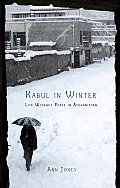 Kabul in Winter: Life Without Peace in Afghanistan by Ann Jones
Kabul in Winter: Life Without Peace in Afghanistan by Ann JonesI looked forward to this book and I even bought it since it wasn't in our library. But I have to say that while reading it I became utterly disgusted with Ann Jones. The book is divided into three parts: in the streets, in the prisons and in the schools. Jones does an excellent job of providing a historical context and in describing women's issues and non-profit work in Kabul. It is these aspects that I appreciated. Jones has a strong background in writing on domestic violence and I would have liked her to use this strength more in her writing.
What turned me off of this book is how she talked about female NGO workers dating and flirting with Afghani men. Jones would go from discussing politics to a conversation about how sexy the cab driver was and wondering if he would consider taking her on as a second wife. It made me lose respect for her as a writer and as a woman. These comments were not needed and they kept taking away from the rest of her experiences of working in Kabul.
Kim's Grade: C Lose the "sexy Afgani men" discussions and focus on Kabul!
Publisher Comments:
Here is her trenchant report from inside a city struggling to rise from the ruins. Working among the multitude of impoverished war widows, retraining Kabul’s long-silenced English teachers, and investigating the city’s prison for women, Jones enters a large community of female outcasts: runaway child brides, pariah prostitutes, cast-off wives, victims of rape. In the streets and markets, she hears the Afghan view of the supposed benefits brought by the fall of the Taliban, and learns that regarding women as less than human is the norm, not the aberration of one conspicuously repressive regime. Jones confronts the ways in which Afghan education, culture, and politics have repeatedly been hijacked—by Communists, Islamic fundamentalists, and the Western free marketeers—always with disastrous results. And she reveals, through small events, the big disjunctions: between U.S promises and performance, between the new “democracy” and the still-entrenched warlords, between what’s boasted of and what is.
At once angry, profound, and starkly beautiful, Kabul in Winter brings alive the people and day-to-day life of a place whose future depends so much upon our own.
No comments:
Post a Comment